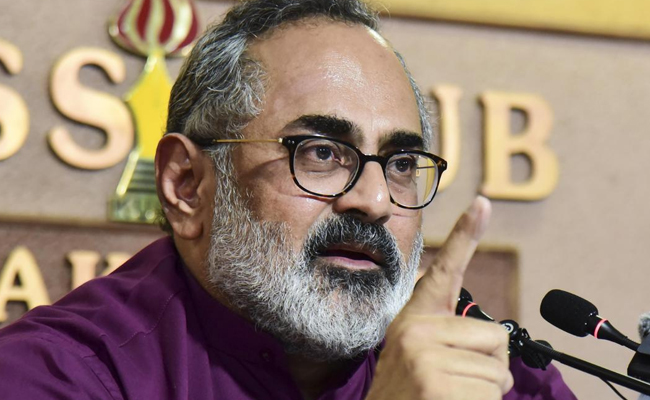New Delhi (PTI): Star javelin thrower Neeraj Chopra hoped to compete with other prominent international names in India sooner than later following his silver medal-winning effort in the Paris Olympics.
Chopra bagged the silver at the Paris showpiece with a throw of 89.45m behind Pakistan’s Arshad Nadeem, who hurled the javelin to 92.97m, an Olympic record.
Anderson Peters of Grenada came third with a throw of 88.54m among the field that included some high-profile javelin throwers like Julian Webber, Jakub Vadlejch and Julius Yego.
"It's a dream of mine to compete with other international stars in India. Hopefully, there will be an international competition soon in India and I can do that," Chopra said during an interactive session with fans organised by the Olympics.com
But before that, Chopra, whose silver was his second successive Olympics medal after the gold in Tokyo, said he wanted to work on certain areas of his game.
"I am entering a new season now. So, I don't have that much time to change training methods or technique. But I hope to improve upon a couple of areas, especially the line of the javelin.
"You know, the correct angle of throwing so that I get more power in my throw. I will certainly work on it," he said.
Chopra said he wanted to give it all in the Paris Games final despite being below his best physically.
"The body conditions (of his) were tough. But when Arshad made that throw...I was able to hit my season's best because the thought was set in my mind that I had to give the best throw because the competition had already become very tough."
Mothers of Chopra and Nadeem had taken the social media by storm as they showered affection on each other's son.
Chopra said his mother always spoke from her heart as she to date remained a simple rural soul.
"My mother…she always stayed in a village before and after her marriage. She is not familiar with social media and things like that. She often speaks from her heart. But she understands what families of athletes, even from different countries, feel towards them."
Praise for Sreejesh, Manu
=================
Chopra lauded shooter Manu Bhaker for showing perseverance to grab two bronze medals in the Paris Games after experiencing utter disappointment in the Tokyo edition.
"The way Manu Bhaker prepared her mind and came from her Tokyo setback is impressive. Her mindset appeared to be very strong this time while taking part in back-to-back competitions. I think it's just a start for her because I saw even people over 50 (age) were participating in shooting.
"I hope Manu will play in a lot more competitions, bring a lot more medals for the country and change the colour of the medal too," he said.
The 26-year-old also hailed Indian hockey team's goalkeeper PR Sreejesh, who retired from top-level competition with a bronze at Paris.
"Sreejesh is a very relaxed and funny person. He motivates younger players a lot. Sreejesh bhai had said that he would retire after the Olympics. The players, I think, also felt that they should win it for Sreejesh bhai after doing so many great things for the team."
Chopra said Sreejesh offers a fine example in tackling pressure situations.
"He has so many years of experience and he knows how to tackle the pressure situations. He seemed to be in his zone when I met him before the bronze medal match," he added.
Let the Truth be known. If you read VB and like VB, please be a VB Supporter and Help us deliver the Truth to one and all.
Judge cites denial of home to Muslim girl, opposition to Dalit women cooking mid-day meals
Hyderabad, February 23, 2026: Supreme Court judge Justice Ujjal Bhuyan has said that despite repeated affirmations of constitutional morality by courts, deep societal faultlines rooted in caste and religious discrimination continue to shape everyday realities in India.
Speaking at a seminar on “Constitutional Morality and the Role of District Judiciary” organised by the Telangana Judges Association and the Telangana State Judicial Academy in Hyderabad, Justice Bhuyan reflected on the gap between constitutional ideals and social practices.
He cited a recent instance involving his daughter’s friend, a PhD scholar at a private university in Noida, who was denied accommodation in South Delhi after her surname revealed her Muslim identity. According to Justice Bhuyan, the landlady bluntly informed her that no accommodation was available once her religious background became known.
In another example from Odisha, he referred to resistance by some parents to the government’s mid-day meal programme because the food was prepared by Dalit women employed as cooks. He noted that some parents had objected aggressively and refused to allow their children to consume meals cooked by members of the Scheduled Caste community.
Describing these incidents as “the tip of the iceberg,” Justice Bhuyan said they reveal how far society remains from the benchmark of constitutional morality even 75 years into the Republic. He observed that while the Constitution lays down standards of equality and dignity, the morality practised within homes and communities often diverges sharply from those values.
He emphasised that constitutional morality requires governance through the rule of law rather than the rule of popular opinion. Referring to the evolution of the doctrine through judicial decisions, he cited Naz Foundation v Union of India, in which the Delhi High Court read down Section 377 of the Indian Penal Code, holding that popular morality cannot restrict fundamental rights under Article 21. Though the judgment was later overturned in Suresh Kumar Koushal v Naz Foundation, the Supreme Court ultimately restored and expanded the principle in Navtej Singh Johar v Union of India, affirming that constitutional morality must prevail over majoritarian views.
“In our constitutional scheme, it is the constitutionality of the issue before the court that is relevant, not the dominant or popular view,” he said.
Justice Bhuyan also addressed the functioning of the district judiciary, underlining that trial courts are the first point of contact for most litigants and form the foundation of the justice delivery system. He stressed that due importance must be given to the recording of evidence and adjudication of bail matters.
Highlighting the role of High Courts, he said their supervisory jurisdiction under Article 227 of the Constitution is intended as a shield to correct grave jurisdictional errors, not as a mechanism to substitute the discretion or factual appreciation of trial judges.
He recalled that several distinguished judges, including Justice H R Khanna, Justice A M Ahmadi, and Justice Fathima Beevi, began their careers in the district judiciary.
On representation within the judicial system, Justice Bhuyan noted that Telangana has made significant strides in gender inclusion. Out of a sanctioned strength of 655 judicial officers in the Telangana Judicial Service, 478 are currently serving, of whom 283 are women, exceeding 50 per cent representation. He added that members of Scheduled Castes, Scheduled Tribes, minority communities, and persons with disabilities are also represented in the state’s judiciary.
He observed that greater representation of women, marginalised communities, persons with disabilities, and sexual minorities would help make the judiciary more inclusive and reflective of India’s diversity. “The judiciary must represent all the colours of the rainbow and become a rainbow institution,” he said.
Justice Bhuyan also referred to the recent restoration by the Supreme Court of the requirement of a minimum three years of practice at the Bar for entry-level judicial posts. While acknowledging that the requirement ensures practical exposure, he cautioned that its impact on women aspirants, especially those from rural or small-town backgrounds facing social and financial constraints, would need to be carefully observed over time.
Concluding his address, he reiterated that the justice system must strive to bridge the gap between constitutional ideals and lived realities, ensuring that the rule of law remains paramount.




